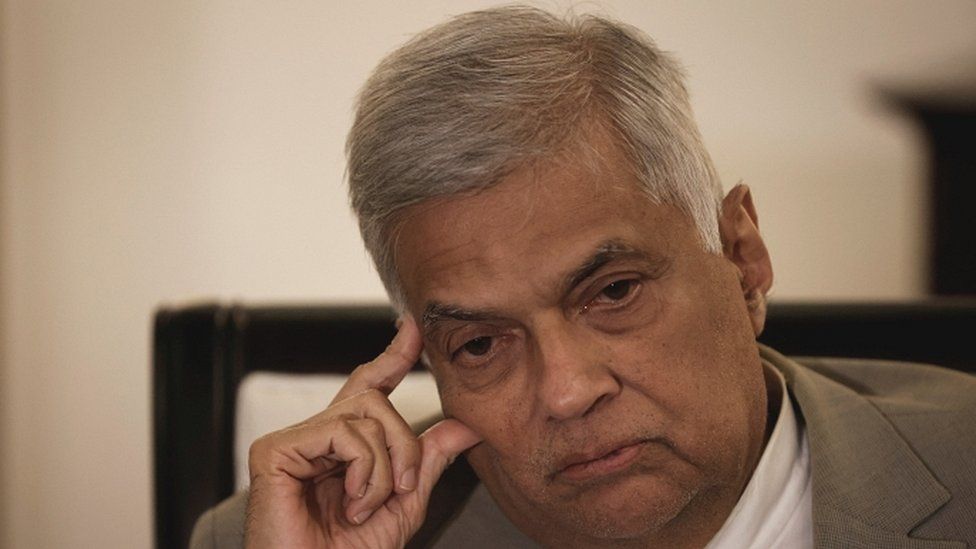Ranil Wickremesinghe: Can Sri Lanka's acting president restore order?
By Asim Tanha
BBC News
Ranil Wickremesinghe has suddenly been promoted from being Sri Lanka's prime minister to its new interim president - but how long he lasts in that job is an open question.
His predecessor in the post, Gotabaya Rajapaksa, fled to Singapore following mass protests over the island's economic crisis.
Mr Wickremesinghe, a senior opposition MP, has been prime minister six times, but has never seen out a full term.
His latest prime ministerial stint began as recently as May, when he was named to the post in an ultimately unsuccessful attempt by Mr Rajapaksa to cling to office.
Mr Wickremesinghe's new role as acting president got off to an inauspicious start when he declared a nationwide state of emergency, only to have it defied by thousands of protesters who stormed his office in the capital, Colombo.
In a TV statement, he denounced the demonstrators as "fascists". But they see him as being too close to Mr Rajapaksa and want him out of power as well. His private residence was set ablaze during unrest on Saturday. He wasn't at home at the time.
Protests flared up in Colombo in early April. Since then, they have grown in size and spread across the country.
For months, people have been struggling with daily power cuts and shortages of basics such as fuel, food and medicines.
The country's foreign currency reserves have virtually run dry, meaning it doesn't have enough funds available to buy goods from other countries.
Resentment at these growing hardships has now boiled over - and at least nine people have lost their lives in the ensuing unrest.
A lawyer by profession, Mr Wickremesinghe comes from an affluent family of politicians and businessmen.
He was first elected to parliament in 1977 and quickly moved up the party ladder after Ranasinghe Pramadasa was elected president in 1989. He first served as prime minister from 1993 to 1994.
In 1994, he became leader of the United National Party (UNP) when Gamini Dissanayake was killed by suspected rebels of the Liberation Tigers of Tamil Eelam.
He himself narrowly escaped an assassination attempt when a bomb went off at a meeting he was addressing in the town of Eppawala.
Mr Wickremesinghe improved his party's image by appointing a disciplinary commission to get rid of corrupt party members.
He also tried to change his personal image with various different haircuts to give himself a more appealing look and he tried to broaden the UNP's public support by touring villages.
In more normal times, around the turn of the century, he was a genuine contender to be elected president, but his star subsequently waned.
He was prime minister during the deadly Easter Sunday bombings in 2019, which killed at least 250 people.
He told the BBC he had been "out of the loop" when it came to intelligence warnings ahead of the attacks.
In the last election, his once ruling UNP managed to scrape together just one parliamentary seat, leaving him its sole representative in parliament - and fuelling his opponents' claims that he lacks legitimacy for office.
One major reason people are angry at Mr Wickremesinghe has been his perceived closeness to the Rajapaksa family. Many people believe he helped shield them when they lost power in 2015.
In an effort to shore up his authority, Mr Wickremesinghe has now instructed a new committee headed by the military and police chiefs to "do what is necessary" to restore order.
But the turmoil is now so great that it is unclear what measures will be equal to the task - or whether Mr Wickremesinghe is the man to do it.
Ranil Wickremesinghe spoke to the BBC in 2019



